- Home
- Lauren Willig
The Masque of the Black Tulip Page 32
The Masque of the Black Tulip Read online
Page 32
In which case, Miles would be waiting for him. He just had to collect Hen, and they could be off. Where was Hen?
Miles cut Turnip off in the midst of a tangled exposition about a pair of chestnuts he had seen at Tattersall’s last month. ‘I wonder what can be keeping Hen?’
Turnip frowned into his glass of porter, shifting his shoulders beneath the rich brocade of his coat and fidgeting on the hard wood of his seat.
‘I say, Dorrington,’ began Turnip uneasily. ‘Didn’t want to say anything before, with Lady Hen present, but it ain’t at all the thing for you to be here alone with Lady Henrietta. Reputation and all that. Know you’re like a brother to her, but—’
‘I’m not her brother,’ snapped Miles, watching the coffee room door. How long could it possibly take for one woman to go to the necessary and back? The young fop in the immense cravat was still standing by the fire, so he didn’t have to worry about her being abducted by force, but…Hen wouldn’t have bolted out a window. Would she?
‘Just what I was saying,’ agreed Turnip, looking relieved that Miles had grasped the crux of the problem so readily. ‘Don’t mean to be Mrs Grundy, you know, but…’
‘Trust me,’ said Miles, frowning at the grandfather clock in the corner of the room, ‘it is a role for which you are singularly unsuited.’
‘Oh, you mean not being female?’ Turnip considered. ‘Daresay I would look deuced odd in skirts, though some of those sprigged muslin rig-outs ain’t half-bad. Little flowers, you know. But what I meant to say’ – Turnip abandoned the fascinating subject of haberdashery to drag himself doggedly back to the topic at hand – ‘is, that is to say…’
Miles dragged his attention away from the door and fixed Turnip with a quelling look. ‘There is nothing havey-cavey going on between me and Henrietta.’ Miles twisted in his seat to look anxiously at the coffee room door. ‘But where is she?’
Chapter Twenty-Eight
Havey-Cavey (adj.): highly suspect, clandestine, illicit; behaviour generally indicative of some nefarious purpose. To be strictly monitored by the conscientious agent
– from the Personal Codebook of the Pink Carnation
Tucking her shawl more securely around her shoulders, Henrietta started up the narrow flight of stairs to which she had been directed by a busy maidservant. With only the meagre illumination to be had from a window on the landing above, the stairwell was dim, and the well-worn treads dipped in the middle. Henrietta picked her way gingerly up the stairs, but her mind was back downstairs in the coffee room, on a pair of anxious brown eyes.
What had Miles really been about to say? No one, not even Miles, could contrive to look that earnest over a beverage. Henrietta mulled through possible endings to that plaintive ‘Hen—’ She didn’t like any of them.
Henrietta sighed and shook her head at herself. She was driving herself to distraction with these futile speculations. Playing a game of ‘What can Miles be thinking?’ was not only fruitless – it was absolutely…
‘…maddening!’ someone exclaimed.
Henrietta paused, one foot on the landing, one on the penultimate step. It wasn’t just that the word exactly encapsulated her own sentiments. She knew that voice. The last time she had heard it, it had been employed in a slumberous murmur of seduction rather than an expression of agitation, but the tones were as unmistakable as they were misplaced.
‘You must be patient,’ counselled another voice, a woman’s voice with a light foreign accent. Even the wooden barrier of the door couldn’t quite detract from the fluid charm of it; although she spoke softly, every tone was as finely hued as a delicately painted piece of porcelain. ‘You do no good to yourself by this, Sebastian.’
Henrietta was so surprised that Lord Vaughn was in possession of a first name that she nearly missed hearing what came next.
‘Ten years.’ Lord Vaughn’s cultured voice thrummed with frustration through the chinks in the door. ‘It has been ten years, Aurelia. What sort of paragon would you have me be, to practice patience for that long?’
Henrietta engaged in rapid mental mathematics. A decade…1793. The little gossip she had managed to glean about Vaughn had been maddeningly imprecise, but the year might coincide with his precipitate departure from England.
It was also, recalled Henrietta, the year the French king had been dragged beneath the blade of the guillotine. Which one was it? Or were they related?
‘If so long, why not a little longer?’ replied the other.
Lord Vaughn – Henrietta really couldn’t think of him as Sebastian, whatever the mysterious woman might call him – drawled something in a low tone that was lost somewhere between the door and Henrietta’s ear. Whatever it was, it elicited an intimate chuckle from his companion.
‘I do not think’ – the accent was very much in the ascendant, as was the affectionate note of laughter – ‘that a paragon should speak so.’
Vaughn’s voice again, quick and impatient. ‘Are you quite certain there was nothing else there?’
Nothing else where? Henrietta frowned at the uninformative wooden panels of the door, wishing there was some way she could get closer, some way she could see.
There was a swish of fabric, as though someone had just subsided into a chair. ‘I made the inspection of his belongings with much thoroughness. And most unpleasant it was, too,’ the woman’s voice added tartly.
Richard’s belongings, perhaps? Henrietta listened with all her might, willing the conspirators to speak further.
Henrietta heard boots on bare wood as Vaughn strolled across the room, followed by the sound of lips meeting – a hand? Lips? Henrietta couldn’t tell. Vaughn spoke, voice heavy with rue and reluctant charm. ‘Forgive me, Aurelia. I am an ungrateful beast.’
Blast. Henrietta scowled at the door. Now he chose to apologise?
‘I know,’ replied the other complacently, and equally uninformatively. ‘But you have your compensations.’
‘Most of them measured by guineas,’ Vaughn replied dryly.
‘If I were any other woman,’ the accented voice chided gently, ‘I would take offence at that.’
‘If you were any other woman,’ countered Vaughn, ‘I would not have said it.’ There was a pregnant pause, a rustle of fabric that might have been an embrace, or merely the woman shifting in her chair – Henrietta cursed her sightless state – before Vaughn resumed, his tone brisk. ‘I leave for Paris on Tuesday.’
‘Are you sure that is wise, caro?’
‘I would have an end to this business, Aurelia. The game has been played for long enough.’ Vaughn’s voice rang with grim finality, sending a reluctant shiver through Henrietta’s thick shawl. So might Beowulf have sounded outside Grendel’s den, girding himself for havoc and death. ‘The time is come to behead the Hydra.’
‘You don’t know that it is she.’ The soft soprano voice made one last attempt.
‘Everything points to it.’ Vaughn’s tone brooked no argument.
Everything pointed to what? To whom? Henrietta shifted her weight to the top step to press her ear more firmly against the door frame. The elderly step shifted and groaned, protesting her weight.
Booted feet clipped towards the door, clicking ominously against the bare planking.
‘Did you hear that?’
Henrietta froze, one hand on the wall.
‘What am I meant to be hearing, caro?’
‘Someone. By the door.’
‘This old building, it is full of the creaks. You are too imaginative, my friend,’ the lightly accented voice chided affectionately. ‘You quarrel with shadows.’
‘My shadows carry swords.’
Vaughn punctuated his words with a staccato flurry of footsteps.
Henrietta didn’t wait to hear more. She careened down the stairs in reckless haste, clinging to the banister as she all but fell down the last three steps. She flung herself around the turn of the wall just as, at the top of the stairs, a door creaked open.
Pressed
against the wall, panting, Henrietta heard Vaughn’s muttered curse, and a warm female voice say, ‘Did I not tell you it would be so? Come, sit by me, and leave the shadows to their rest for an hour.’
He couldn’t find them there.
Henrietta’s mind raced in tandem with her rapidly beating heart. If Vaughn had been searching Richard’s study… If the ‘she’ to whom he had referred was somehow, incomprehensibly, Jane… If – Henrietta mustered the greatest, most alarming ‘if’ of all – if Vaughn was the Black Tulip, they must get away before he knew they had been there.
Vaughn had said he wasn’t leaving till Tuesday. If he were the diabolically clever Black Tulip, he might have been deliberately laying false clues, but Henrietta didn’t think his alarm at hearing a footstep outside the door had been feigned. Their best chance was to return to London and inform the War Office of everything that had transpired and allow them to take the appropriate steps.
Tearing into the coffee room, narrowly avoiding a slender man in an immense cravat, wearing a high-crowned black hat pulled low over his ears, Henrietta grabbed Miles by the arm and tugged. ‘I really think we ought to go now.’
Miles looked at her quizzically. ‘The food only just arrived.’
Henrietta cast him a look of urgent appeal. ‘Please? I’ll explain in the carriage.’
Miles shrugged, bemused but game. ‘Righty-ho, then.’
Rising, he stretched – Henrietta gave an agitated little hop – snagged his hat and gloves from the chair beside him – ‘Come on, come on,’ urged Henrietta under her breath – and tossed a few coins on the table.
‘That ought to cover it.’
‘But—’ began Turnip, gesturing inarticulately to the platters and jugs arrayed before them.
‘Sorry, Fitzhugh’ – Miles paused in the doorway to wave his hat in the direction of his friend – ‘must be going.’
Miles abruptly staggered out of view from the doorframe as Henrietta applied pressure to his arm.
‘Havey-cavey,’ muttered Turnip, shaking his head after them. He speared a piece of mutton and regarded it fiercely. ‘Deuced havey-cavey!’
Henrietta chivvied Miles out into the yard, glancing anxiously behind them as Miles sent for the curricle. There was no sign of Vaughn in the doorway, or lurking around the sides of the building (Henrietta hadn’t discounted the possibility of other exits) or at the windows above their heads. Only the dandy in the absurd cravat had strolled out behind them, yawning in the afternoon sunlight as he waited for his carriage and team to be brought about. There was something vaguely familiar about the man, but Henrietta didn’t have time to waste chasing memory to its lair. Undoubtedly one of the many chinless wonders with whom she had stood up at the series of endless events that composed her two and a half seasons on the marriage market.
‘You seem to have acquired an admirer,’ Miles commented shortly, boosting her into the curricle. He paused to glower at the man in the doorway, who continued to admire his own stickpin, supremely unconcerned.
‘Hurry,’ urged Henrietta. As if to back her up, the horses, a new team, pranced restlessly in their harness as the ostler handed off the reins to Miles.
Miles slapped the horses into motion. ‘Do you care to explain what’s going on?’
Henrietta flapped an agitated hand at him, twisting to stare over the folding back of the curricle at the rapidly receding inn yard. ‘Later!’
Since it took Miles several moments to get the measure of the new team, and Henrietta seemed more inclined to squirm in her seat and cast anguished glances behind them than speak, it was several moments before Miles broached the topic again.
‘Not that I mind being bereft of Turnip’s company,’ said Miles, steering his way expertly around two hens that had decided to cross the road, ‘but why the sudden desire to leave? Dare I hope it was a passionate desire to be alone with me?’ His eyebrows drew together. ‘Was that man bothering you? If he was, I—’
‘No, nothing like that.’ Henrietta cast a haunted look back over her shoulder. A black post chaise, clearly a private vehicle, although a well-worn one, tooled along the road behind them, but it was far enough away to ensure them a modicum of privacy. Nonetheless, just to be safe, Henrietta hunched towards Miles and lowered her voice for greater secrecy. ‘There was something suspicious going on back there.’
Miles grimaced. ‘Something about a propitious dancing bear?’
Maybe her voice hadn’t needed to be quite that low.
Henrietta started again. ‘When I went upstairs, I overheard Lord Vaughn in the private parlour.’
Miles shot up in his seat. ‘What!’
Since Henrietta had been speaking quite clearly that time, she correctly assumed that Miles’s exclamation had more to do with surprise than lack of comprehension. ‘He was speaking with a woman with a foreign accent – it was a very light accent, but still noticeable.’
Miles smacked one gloved hand against the side of the curricle. ‘Fiorila!’
‘Flowers?’ said Henrietta, perplexed.
‘Poisonous ones.’ Miles hauled on the reins, preparing to bring the carriage about. ‘Why didn’t you tell me before we left?’
‘Shhh!’ exclaimed Henrietta, glancing anxiously behind them. The other carriage had also checked.
‘I don’t think they can hear us.’ Reluctantly, Miles slapped the reins, signalling the horses to go forward. ‘It’s probably too late to go back,’ he said, more to himself than to her. ‘Vaughn and his companion will have flown the coop by now. Damnation! If I’d known—’
‘That’s exactly why I didn’t tell you. It just didn’t seem like a good idea.’ Henrietta struggled to rationalise her impulse. ‘We don’t know who he had with him—’
‘Oh, I have a very good idea of that,’ Miles muttered.
‘– or if he was armed,’ continued Henrietta pointedly. ‘If he is the Black Tulip, doesn’t it make far more sense to apprehend him in London, with all the might of the War Office at your disposal, rather than out in the middle of nowhere? For all we know, the inn might have been swarming with his men! Or he might not even be the Black Tulip,’ she added as an afterthought. ‘Something didn’t sound quite right.’
‘Ungh’ was what Miles thought of that reservation, but he grudgingly admitted the validity of the former. ‘I’ll go see Wickham tomorrow morning.’
‘Why not tonight?’ asked Henrietta.
‘Because tonight’ – Miles raised a pair of sandy eyebrows – ‘is my wedding night.’
Henrietta discovered a sudden interest in the scenery.
Wedding night, thought Henrietta, staring unseeingly at Streatham Common. That was what generally followed a wedding. Usually at night. Hence the term ‘wedding night,’ which combined the concepts of both wedding and night.
Henrietta bit down hard on her lip, making a concerted effort to rein in her wayward mind before she launched into a long and tangled analysis of wedding customs from the Anglo-Saxons to the present, and what exactly the etymology of the word ‘night’ might be.
The origin of the word ‘evasion,’ she thought, glowering at a cow grazing on the Common, would be more to the point.
There were so many thoughts to evade that Henrietta didn’t even know where to begin. Did Miles’s mention of the wedding night mean that he intended to go through with the marriage? Or was he bringing up the topic in the hopes that she would broach the ridiculousness of their remaining married? His face had been as inscrutable as it was possible for Miles’s face to be. He hadn’t looked particularly put out at the notion of consummating their marriage – he hadn’t sounded bitter or resigned or angry, or any of the other sentiments one might expect of a reluctant bridegroom – but he hadn’t seemed particularly enthused, either.
Bleargh.
Miles reined in slightly to allow a farmer’s cart to pass. The carriage behind them reined in, too. Henrietta frowned.
‘Miles?’ Henrietta asked uneasily. ‘Am I imagining things, or
has that carriage been behind us for a very long time?’
Miles shrugged, unconcerned. ‘It might have been. It wouldn’t be surprising if it were. Now, about Vaughn…’
Henrietta twisted in her seat to stare back at the carriage. ‘But don’t you find it the least bit odd that they rein in every time you do?’
‘What?’ Miles twisted sharply in his seat, inadvertently giving a sharp tug on the reins. His horses checked abruptly.
So did the horses of the carriage behind him.
‘What the devil!’ exclaimed Miles, subsiding back into his seat.
‘Exactly.’ Henrietta drew in a sharp breath between her teeth. ‘I don’t like this.’
‘Neither do I,’ said Miles.
He shoved the ribbons into her gloved hands.
‘Here, take the reins for a moment. I want to take another look.’
Taken aback, Henrietta grappled with the four sets of ribbons Miles had handed her, trying to figure out which was which, as Miles clambered over the back of the seat. Sensing an inexperienced hand on the reins, the horses lurched alarmingly. Miles paused, balanced on the top of the seat, facing backwards.
‘Just hold them steady, Hen,’ he directed, leaping nimbly onto the perch usually reserved for a groom. The curricle rocked dangerously.
‘Just hold them steady?!’ repeated Henrietta incredulously, struggling to keep the right leader in line. He showed a distressing tendency to try to veer off to the side. It had been a long time since Henrietta had driven anything but Miles’s phaeton, and that at the sedate pace mandated by the congestion of the park. She tugged fruitlessly at the reins as the carriage swayed to the right. ‘Miles! Please try not to overturn us!’
‘Damn.’
‘What?’ Every muscle in Henrietta’s body tensed, but she didn’t dare take her attention from the road. ‘What is it?’
Miles vaulted back into his seat, taking the reins from her with a practiced hand. ‘You’re not going to like this,’ he said, urging the team forward and drawing the recalcitrant leader effortlessly back into line.

 That Summer
That Summer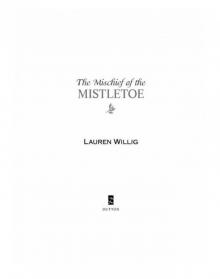 The Mischief of the Mistletoe
The Mischief of the Mistletoe The Mark of the Midnight Manzanilla
The Mark of the Midnight Manzanilla The Other Daughter
The Other Daughter The Ashford Affair
The Ashford Affair The Lure of the Moonflower
The Lure of the Moonflower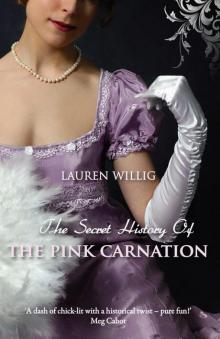 The Secret History of the Pink Carnation
The Secret History of the Pink Carnation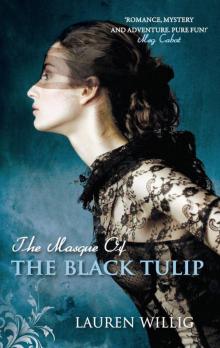 The Masque of the Black Tulip
The Masque of the Black Tulip The Passion of the Purple Plumeria
The Passion of the Purple Plumeria The English Wife
The English Wife The Garden Intrigue
The Garden Intrigue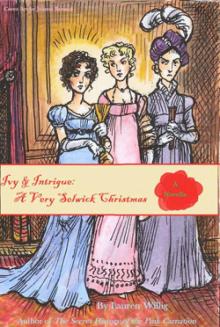 Ivy and Intrigue: A Very Selwick Christmas
Ivy and Intrigue: A Very Selwick Christmas The Orchid Affair
The Orchid Affair The Summer Country
The Summer Country The Betrayal of the Blood Lily
The Betrayal of the Blood Lily The English Wife: A Novel
The English Wife: A Novel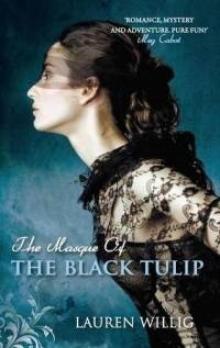 Masque of the Black Tulip pc-2
Masque of the Black Tulip pc-2 The Secret History of the Pink Carnation pc-1
The Secret History of the Pink Carnation pc-1 That Summer: A Novel
That Summer: A Novel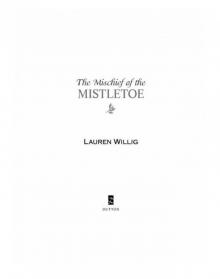 The Mischief of the Mistletoe: A Pink Carnation Christmas
The Mischief of the Mistletoe: A Pink Carnation Christmas